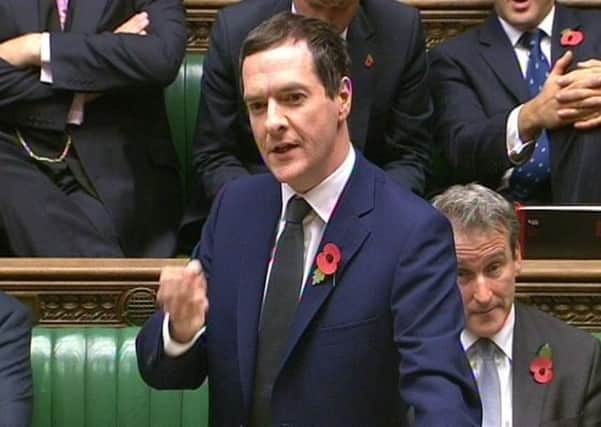Tories move to limit Lords power after defeat


Chancellor George Osborne has insisted he will press ahead with changes to reduce the welfare bill, despite the House of Lords backing two motions on Monday which delay the £4.4 billion cuts in working tax credit and child tax credit. In the aftermath of the first vote by peers to overturn a Commons decision on government spending since 1911, the Chancellor had dropped clear hints about changing the rules to ensure it could not happen again.
He also said the Lords vote breached the convention that the Upper House does not block financial decisions made by the Commons, raising “clear constitutional issues which we will deal with”.Prime Minister David Cameron has now ordered a “rapid review” of the relationship between the two Houses of Parliament, to be chaired by former Lords leader Lord Strathclyde.
Advertisement
Hide AdAdvertisement
Hide AdA Number 10 spokesman said: “The government is setting up a review to examine how to protect the ability of elected governments to secure their business in parliament. The review would consider in particular how to secure the decisive role of the elected House of Commons in relation to (i) its primacy on financial matters; and (ii) secondary legislation.
“The review will be led by Lord Strathclyde, supported by a small panel of experts.”
Under bombardment from opposition MPs over his plans – which will hit the poorest families by an estimated £1,300 on average in order to cut £4.4 billion from the welfare bill – Mr Osborne insisted he was “listening” and would bring proposals to mitigate the worst effects in his Autumn Statement at the end of next month.
But speaking at Treasury questions in the Commons, Mr Osborne confirmed he will press ahead with the cuts package.
He told MPs: “Last night, unelected Labour and Liberal peers voted down the financial measures on tax credits approved by this elected House of Commons. That raises clear constitutional issues which we will deal with.We will continue to reform tax credits and save the money needed so that Britain lives within its means, while at the same time lessening the impact on families during the transition. I will set out the plans in the Autumn Statement. We remain as determined as ever to build the low-tax, low-welfare, high-wage economy that Britain needs and the British people want.”
SNP Treasury spokesman Stewart Hosie said Mr Osborne was “in denial” about the impact of his plans.
He added: “Did not yesterday, 26 October, demonstrate two things – the Chancellor has lost his political touch, and his chance of being Prime Minister has just gone up in a puff of ermine-clad smoke?”
Shadow Chancellor John McDonnell urged the Chancellor to avoid the need for tax credit cuts by reversing inheritance tax breaks for “the wealthiest few” and scaling back the size of surplus he is aiming to run by the end of the parliament.
Advertisement
Hide AdAdvertisement
Hide AdHe added: “Can he assure us that whatever proposals he brings forward, he will not support any that an independent assessment demonstrates will cause any child to be forced to live below the poverty line?”
The Chancellor said he would listen to any proposals Mr McDonnell had “to help in the transition” to lower tax credits.
Commons Leader Chris Grayling earlier said nothing had been ruled out in the review on constitutional arrangements governing the two Houses of Parliament ordered by Mr Cameron – including the possibility of creating 100 or more new Tory peers to secure a majority in the Upper House. Mr Grayling said Monday’s votes reflected unelected Labour and Liberal Democrat peers trying to “wreck the government’s programme”.
But senior Conservative backbencher David Davis, who is backing another critical motion on the tax credit changes to be debated in the Commons on Thursday, said the constitutional questions raised by Monday’s votes were a side issue.
“The simple truth is that this was an incredibly important, possibly harmful, thing to three million people – hard-working families, the people we are supposed to support – and somebody had to tell the government to think again,” Mr Davis said.